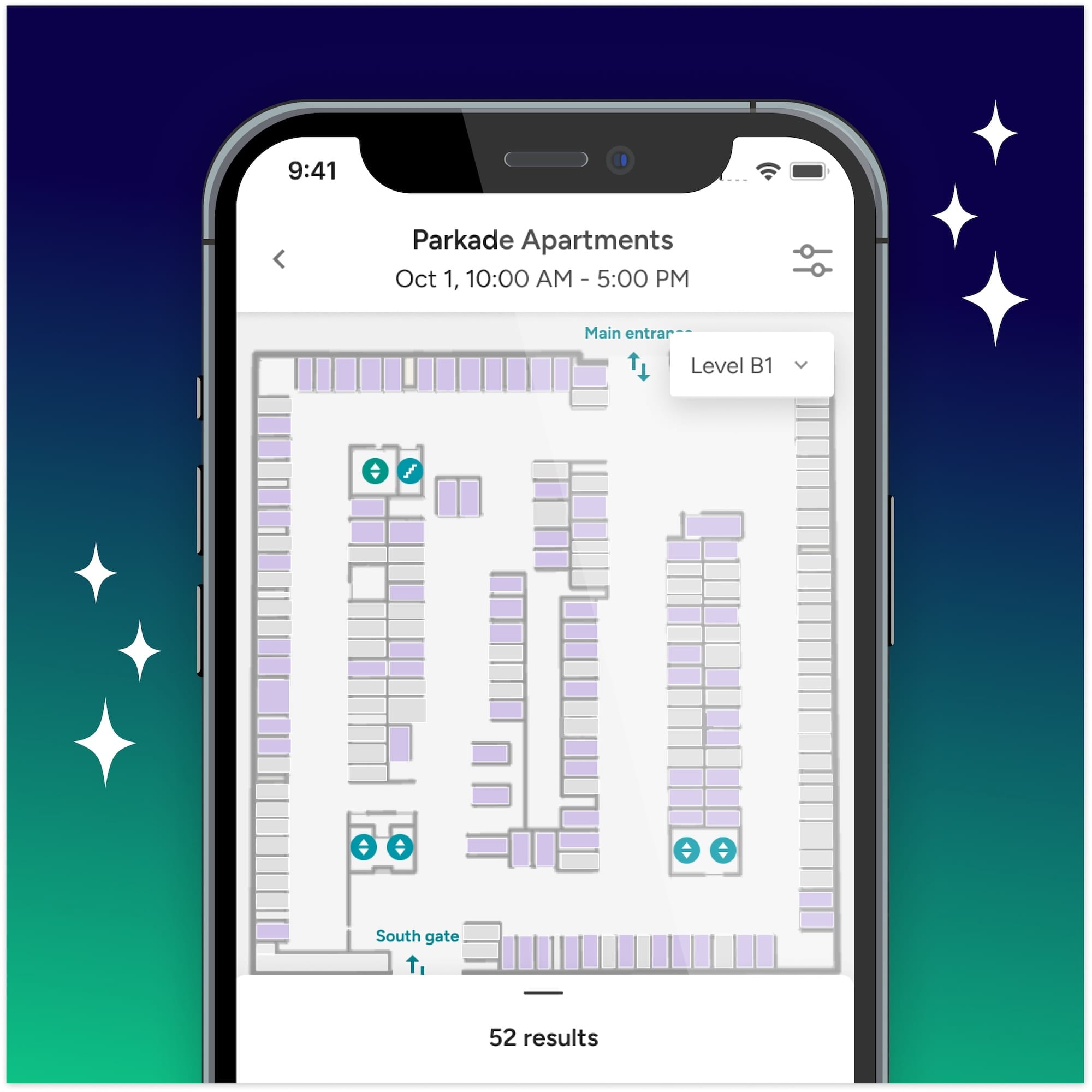

TABLE OF CONTENTS
No one likes towing cars. For property managers, managing the tow and fielding complaints from residents is exhausting. And for residents, the pain is even worse. Getting towed — whether rightfully or in error — negatively impacts their overall experience at your community and can lead to bad reviews and the decision not to renew a lease.
Renae, a property manager we consulted, advocates for a more empathetic perspective on towing:
“Towing a vehicle could mean the person can't go to work, take kids to school or get groceries. Money is so tight that the tow bill would devastate many families. Please, proceed with caution and compassion.”
You also have to consider the complex legal standards of when you can and cannot tow, which can vary from state to state. Failure to comply with these can land you with a hefty fine or even getting sued.
Despite all of these complications associated with towing, property managers often feel pushed into a corner, thinking that towing is the only way to nip unauthorized parking in the bud.
Although towing may be the best solution in some cases, in this blog we want to highlight some alternative solutions that can bolster your enforcement strategy without all of the hassle.
You may be able to eliminate much of the need for towing altogether if you address the underlying issue. In many cases, improper parking is caused by a parking shortage, whether for tenants, guests, or both. If people have nowhere to park properly, they likely feel they have no choice but to keep parking improperly.
Towing, or using alternative consequences, is only going to add fuel to that fire. So you first want to make sure that you get your parking shortage in check before you double down on towing.
We went into all of the possible solutions to resolve your shortage in-depth in a recent blog post, so we’d recommend checking that out before you continue.
Good communication is critical to preventing improper parking in the first place. Uncertainty around parking rules will lead to more people parking where they shouldn’t be, and more headaches for your team. This means making your parking rules easily accessible and readily understandable, and making it easy for residents trying to follow the rules.
As an example, take a look at your existing protocols: When a resident purchases a new vehicle or has a guest over, are you requiring them to obtain a physical pass or sticker for that vehicle? If so, what should that resident do if they are not able to come by during business hours, or if your staff is giving a tour or otherwise unavailable? These types of barriers can be frustrating for your residents, especially when they are trying their best to follow your community’s rules.

Any time the rules change, be sure to communicate across several channels, like email, push notifications, and physical letters on their doors or in their mailboxes. Make sure to also give your residents adequate time to adjust to the changes, especially if it requires any physical changes or movements — you never know when someone might be out of town!
Clear signage around your property is also crucial. Putting up signs that state clearly what parking is and isn’t allowed in certain zones, as well as the consequences that people will face for breaking the rules, will eliminate the possibility of improper parking by way of ignorance or uncertainty. While there is signage that is required by law, you may want to go beyond these requirements to make sure you cover all of your bases.
There are times when a simple warning will suffice to quickly resolve any parking issues, preventing the need to tow. Some common scenarios where you might give a warning are:
Many properties like to lead with this gentler approach to give residents the opportunity to correct their parking mistake before experiencing consequences.
One property manager, Patience, told us:
“If the vehicle is in our system, we contact the resident. Typically that solves it.”
These warnings can be via email, text, phone call, or push notification if you have contact information associated with the car. This typically leads to quicker solutions.
If your records aren’t up-to-date or the mis-parked car doesn’t belong to a tenant, you can leave a paper notice on the windshield. However, it’s possible the parker won’t see this notice until they are about to leave anyway. You’ll also likely need to create a log and keep track of violators or vehicles that have received warnings so you can keep an eye out for repeat offenders.
Typically, fines are a big enough deterrent to get tenants to stop parking improperly. If you are able to trace a vehicle to a certain resident, you can tack the fine on as a line item to their monthly parking fee or ledger. Tech-based parking systems make it extremely easy to automate these fines.
Even a fine as small as $20-30 can make someone think twice about ignoring the rules, and is likely preferable to the hefty $200-400+ fees for retrieving a towed car.
If smaller fines aren’t working, you could always increase the fines as offenses build up. For example, charge $25 for first offenses, $50 for second offenses, and $70 for third offenses.
This fine can serve as a warning of sorts, too, before towing. You can assign a fee with the caveat that if they don’t move within a set period of time (typically within 24 hours or by the end of the day), you will tow.
Other properties use a point system:
“We use a point system with one point per infraction,” property manager Ben Johnson told Parkade. “The first point is a warning, 2-4 points are fines, and at 5 points we tow.”
Another benefit of issuing warnings or fines is that they can be waived or removed. On the off-chance you made an error, such as identifying the wrong car, or even if you just want to give the resident another chance, removing a fine or warning from someone’s ledger or file is always an option.
This is usually not the case with the next, heavier enforcement options: booting or towing. Once these physical enforcement methods are used, there’s no easy way to “take them back.”
Of course, fines are not a feasible option for unknown vehicles that might belong to guests or random cars from outside the community. For a solution that is a little less intense than towing for these situations, booting or adding a barnacle may be a good solution.
The purpose of these contraptions is to demobilize an offender’s car, forcing them to pay a fine in order to move their car.
Booting or barnacle fees are typically around 25% less than a towing fee and more convenient since they don’t have to arrange transportation to the tow yard, so the consequences are slightly less severe.
One useful aspect of boots or barnacles is that they serve as a visual deterrent to the community. If someone is considering parking where they shouldn’t — but notices a car or two with a boot — they’ll most likely reconsider.
However, there is a big downside to these when compared to towing: the offending vehicles remain in their spots. Whereas towing immediately clears the cars out of the spots, having tons of booted cars hogging your spaces may not solve your problems.
There are some locations where booting is illegal as well, similar to towing, so you want to make sure you look into the legal complexities in your area.
As we mentioned above, although towing is a pain, sometimes it’s necessary. Every property is different, and management may have certain preferences, but some general scenarios include:
Here’s an example of one property manager’s criteria for towing in special zones:
“If they’re parked in handicap spots, ignoring closed-off parking areas (for painting, repairs, etc), or other such 'major' infractions, we will tow the same day. We will tag it or call the resident and tow by 5 if not moved or the issue isn’t resolved.”
As we mentioned, some properties like to use a point system to determine when to tow. Once parkers rack up a certain amount of points, or have been reported a certain number of times, they are automatically towed.
Others have standards that are more specific to the features of their parking lot. One property manager, Sara, told us:
“I only allow them to tow if someone was in covered parking with no sticker or not registered or in handicap with no handicap permit displayed. I don’t allow them to tow for tags being out or inoperable unless the manager called personally to request a tow.”
What works best for many properties is simply scheduling tow patrols on a regular basis, balanced with other enforcement methods like warnings or fines:
“Our towing company comes out once a month and tags cars for non-movement, tabs, broken down, flat tires, etc. We also drive the property daily and issue warnings if needed.”
It is important to note that while patrolling can be a great way to actively monitor for violators, several states have banned the practice, or are thinking of doing so. If patrolling is legal in your location, and you choose to utilize that option, make sure to have extremely clear signage and rules to ensure fairness and prevent any allegations of predatory towing.
Reliable and consistent enforcement is key in creating a pleasant parking experience for both your tenants and your staff tasked with managing it. This all starts with having good records.
Without a reliable system that is always up-to-date, enforcement is nearly impossible. Accidentally towing someone because your records weren’t up to date can be expensive, and can damage your relationship with a rule-abiding resident. On the flip side, letting someone get away with parking somewhere they’re not allowed to because your records aren’t up-to-date can also quickly spiral into frustration.
If you do need to have a vehicle towed from your property, having thorough documentation of the violation is vital in ensuring you can fend off any allegation of unfairness. Make sure you have documented evidence of the violation, which may include photos of the vehicle and evidence of where it was located, written statements, and any records of prior warnings.
So, before you can even consider enforcement methods, make sure you have a strong foundation in place. For more tips on getting your end-to-end enforcement strategy in shape, check out our Enforcement Parking Guide.
If you’re really clear that you need a better system to manage your parking, learn more about Parkade’s app-based, always up-to-date parking management solution.
.jpg)
As parking management becomes increasingly digital, security becomes critical — and we’re excited to share that we've achieved a major security milestone.
Read Story
We’re thrilled to announce one of our most significant leaps forward this year: the launch of dynamic maps across our mobile and web applications.
Read Story
Now that AB 1317 is official, it’s time to brush up on the requirements and see how your properties stand to benefit.
Read Story